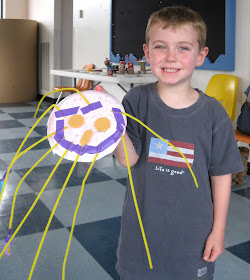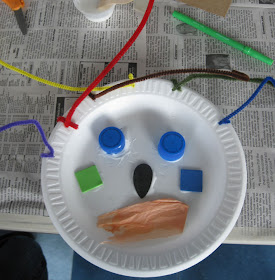 Last week, we had yet another fascinating discussing following our 4th screening of “Where Do the Children Play?,” this time at the Pennfield School in Portsmouth. Each has been different, and we're amazed to see how many layers there are to this conversation.
Last week, we had yet another fascinating discussing following our 4th screening of “Where Do the Children Play?,” this time at the Pennfield School in Portsmouth. Each has been different, and we're amazed to see how many layers there are to this conversation.This screening drew an interesting mix of educator/parents, people representing nature organizations, and folks working in sports and recreation – and the discussion kept leading right back to powerful moments from the film. Many people were struck by a scene that showed vast differences in the way city kids and suburban kids constructed their neighborhoods from cardboard boxes – the city full of smiling people and open doors, the suburbs full of parking lots, big box stores, and not a person in sight.
The conversation:
• Panelist & pediatrician Beth Lange, president of the RI chapter of the American Academy of Pediatrics, remarked that “play happens anywhere.” She encouraged parents to encourage imaginative play anywhere, using anything and to talk to their child’s pediatrician about their kids’ play.
 • Panelist Andy Arkway from Aquidneck Land Trust talked about the importance of giving people meaningful experiences in the outdoors to encourage a more profound connection to nature and responded to the part of the film where experts lament the decline in creativity that follows reduced playtime: “it’s not just who will be the free thinkers, but who will be the next generation of environmentalists if we don’t teach kids to care?”
• Panelist Andy Arkway from Aquidneck Land Trust talked about the importance of giving people meaningful experiences in the outdoors to encourage a more profound connection to nature and responded to the part of the film where experts lament the decline in creativity that follows reduced playtime: “it’s not just who will be the free thinkers, but who will be the next generation of environmentalists if we don’t teach kids to care?”• Panelist Rob Cardeiro from Norman Bird Sanctuary talked about how he sees Richard Louv’s idea of “no child left inside” entering the collective consciousness and that, regarding kids’ play, “the important thing as a parent is to take a step back, hold yourself back, see it happen.”
• Will Glennon, athletic director at Pennfield: “What I see working with kids in a playful environment – in gym class and on the athletic fields – is a dampening of creativity” because organized sports & other activities constitute so much of playtime. “I want kids to make choices about what sports and activities they do.”
• A 2nd grade teacher at Pennfield said she felt sorry for young parents who feel the need to enroll their kids in activities and don’t want to miss any opportunities. She supervises recess and said, “it’s the only time in the day when kids can just play – free play – and even older kids let go,” that it’s their time to be creative.
• A reminder that children do better in school if there’s ample time for recess!
 • During a discussion about the amount and impact of technology in kids’ lives, Dr. Lange said that the American Academy of Pediatrics recommends no screen time before the age of 2 and to limit to 2 hours a day after that – which several parents said still seems like a lot. She said that kids are getting used to “sound bites,” that technology is affecting their attention spans and “you lose them after 30 seconds, the next commercial break.” She talked about attention and obesity being major problems and that, when a child walks into her office, she can tell right away how much screen time he has.
• During a discussion about the amount and impact of technology in kids’ lives, Dr. Lange said that the American Academy of Pediatrics recommends no screen time before the age of 2 and to limit to 2 hours a day after that – which several parents said still seems like a lot. She said that kids are getting used to “sound bites,” that technology is affecting their attention spans and “you lose them after 30 seconds, the next commercial break.” She talked about attention and obesity being major problems and that, when a child walks into her office, she can tell right away how much screen time he has.• Several parents talked about the importance of talking to other parents, of kids’ friends, about how much screen time they’re allowed.
• A Pre-K teacher at Pennfield: “The challenge for the educator today is that parents have high expectations for technology in the classroom” (although hers is a technology-free environment) and that, because of parent expectations, “there’s no room to play. We’ve gone from learning through play to…'What are they learning?’”
 • A mother of 3 who recently moved from Norway agreed about parents’ expectations and said it’s different here. “Other parents expect me to have a plan for ‘play dates.’ The culture is so efficient”… but to play and get in touch with nature takes time.
• A mother of 3 who recently moved from Norway agreed about parents’ expectations and said it’s different here. “Other parents expect me to have a plan for ‘play dates.’ The culture is so efficient”… but to play and get in touch with nature takes time.• “I hate the word play date… it sounds like play has to be scheduled.”
• Andy: A lot of adults are not comfortable outside, so it’s important to provide opportunities for them to feel comfortable. More about the role of adults: “Where do the adults play? We’re such a selfish society now, everyone doing individualized things.” “When kids don’t see their parents playing or enjoying the little things or learning – how do they learn to?”
 • A parent said parts of the film made him feel guilty – other parents and teachers agreed – but moderation is the important thing, to “do the best that you can.” Another said “even if it’s 60/40, look at what you are doing, not what you aren’t.”
• A parent said parts of the film made him feel guilty – other parents and teachers agreed – but moderation is the important thing, to “do the best that you can.” Another said “even if it’s 60/40, look at what you are doing, not what you aren’t.”• Susan Cooper, director of Newport’s Dept. of Recreation, said she’s trying to “connect the disconnected” and would like to create a website that lists all of the island’s activities and free play opportunities in one place. “We have to look at the example we’re setting… if parents are on cell phones, texting their friends… then we say ‘go out and play’” – it’s hypocritical. She’s pushing to get more funds for parks and urban spaces – and to get the “no child left inside” bill passed.
• A woman who was struck by the city vs. suburbs scenario described above said she could relate. She grew up the city and had to negotiate constantly – with people, public transportation. She was always with people and, when she moved away from the city, at first felt isolated and uncomfortable being alone. She didn’t know her neighbors and they didn’t introduce themselves.

• Museum director Janice O’Donnell said that it’s important to meet neighbors and for grown-ups to be outside, too – “it’s how we can make our communities more family friendly and kid friendly.”
• Rob: “In suburbia, each ‘enclave’ can be so different” because you don’t know what sort of neighborhood or neighbors you’ll end up with, but it seems like the urban experience is somewhat more uniform.
• Beth: Dr. Kenneth Ginsberg has a book where he describes “the buoyancy and resiliency of childhood” – we may live in isolated neighborhoods but can learn to adapt. She also talked about the medical ramifications of kids not being outside, such as vitamin D deficiency and lack of physical activity.
• We need to give kids confidence by entrusting them with responsibility – and we need to challenge our children.
~~~~~~~~~~~~~~~
Whew…. What a conversation! If you missed it, don't worry - we have another coming up in just two weeks: "Where Do the Children Play?" documentary screening
"Where Do the Children Play?" documentary screeningTuesday, November 10
6:30 - 8:30 PM
Friends Academy
1088 Tucker Road, North Dartmouth, MA 02747
6:30 - 8:30 PM
Friends Academy
1088 Tucker Road, North Dartmouth, MA 02747
Panelists include Dartmouth Natural Resources Trust director Dexter Mead; Children’s Museum director Janice O’Donnell; Friends Academy director of outdoor education Charley Pelissier; and developmental psychologist Dr. Richard Rende.
Click here to download a flyer. For more information, contact Megan Fischer at fischer@childrenmuseum.org or visit the film’s website.
Presented by Friends Academy, Providence Children’s Museum, Children's Circle Nursery School and Smith Mills Weekday Nursery and with assistance from Michigan Television.




 Carole Ann created 8 new aprons so that we have plenty of extras to switch out during
Carole Ann created 8 new aprons so that we have plenty of extras to switch out during 
















